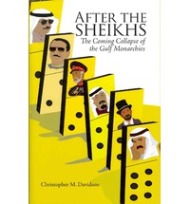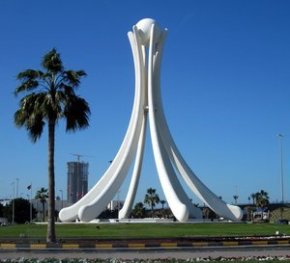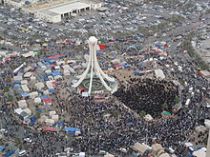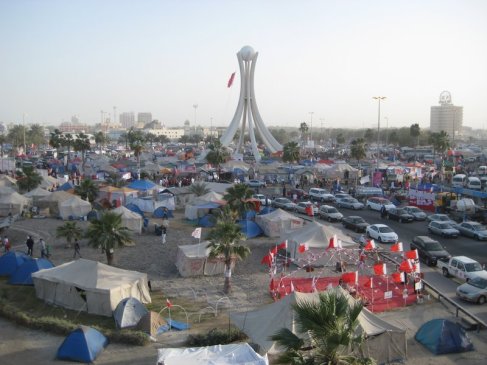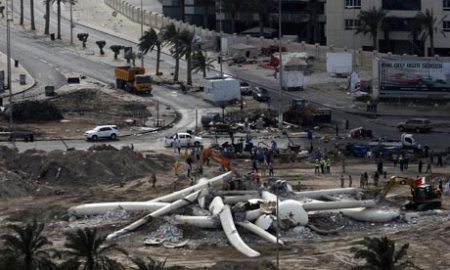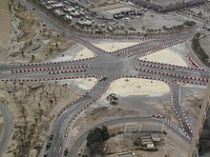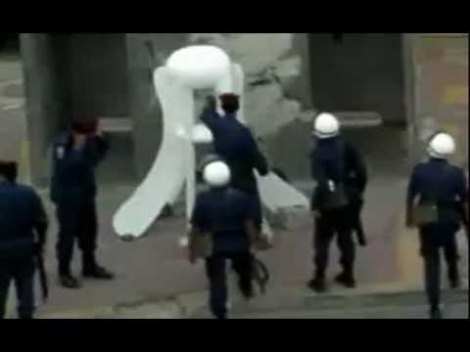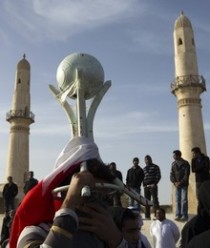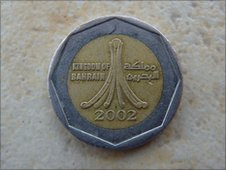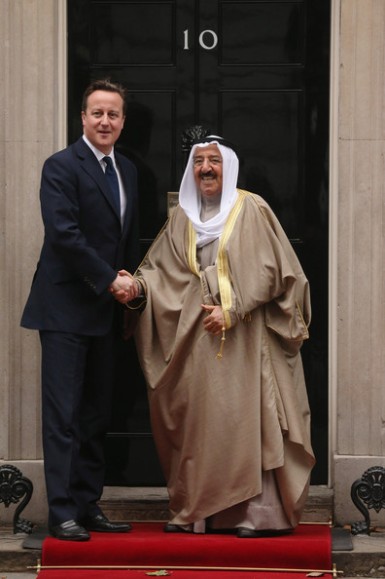BOOK REVIEW
Dr. Davidson’s brilliant and brave “After the Sheikhs” provides Middle East studies with a valuable overview of the gathering crisis in the region, and is a valuable counter-narrative to the “nothing to see, move on now” narrative being promoted by vested interests and an academe that ought to know better.
After Bahrain, the coming domino effect in the Gulf.
Dr. Christopher Davidson’s new book After the Sheikhs: The Coming Collapse of the Gulf Monarchies (Hurst, 2012) is a timely and bold contribution to the growing body of writing on the profound, generational transformations currently underway in the Arab world. These are commonly but quite unhelpfully referred to in the English-speaking media as the ‘Arab Spring’;however, these are generally known as ‘thawraat l-karaama’, ‘Revolutions of Dignity’ or ‘intifaaDaat l-karaama’, ‘Uprisings of Dignity’ by Arab world participants — the dignity in question being the restoration of basic human dignity in the face of corrupt, bullying, and incompetent regimes. One of the slogans of the Bahrain revolution is ‘hayhaat minnaa adh-dhilla’ ‘No more humiliation for us!’
Dr. Chris Davidson
Davidson — Reader in Middle East Politics at the University of Durham — helped ‘deconstruct Dubai’ ahead of the 2009 bursting of the ‘Dubai bubble’ in his book Dubai: The Vulnerability of Success (2008). In After the Sheikhs he reminds us of the internal and external factors that render the GCC states deeply unsustainable, at least as currently constituted, predicting their fall ‘within the next three to five years’. He carefully takes apart ‘exceptionalist’ arguments used to explain the survival to-date of the otherwise anachronistic GCC autocracies, forensically opening to view the tensions and contradictions that will lead to the collapse of the region’s monarchical dictatorships. While commentators like Con Coughlin of The Daily Telegraph seek to persuade us that ‘Arab spring protesters [are] charmed by “divine right of kings” to rule’, Davidson shows us how contingent the GCC entities are to the geo-political and economic realities of the mid C20th, how dependent they are Western defence and security support, and how fatally anachronistic they are becoming as the C21st progresses.
Bahrain’s Pearl Roundabout “diwaar lu’lu’ah” was completed in 1982 to celebrate the unity of the recently-formed GCC, each ‘dhow sail’ pillar supporting the pearl represents on of the GCC states — it was Bahrain’s most conspicuous and prestigious modern monument.
Davidson’s analysis contrasts markedly with the British Foreign and Commonwealth Office’s Gulf strategy, which seems to be aimed at ringfencing the GCC states from the ‘Arab Spring’, which — the FCO along with the Telegraph and myriad PR agencies would have believe — is something that has affected only the Arab world’s republican dictatorships. At the time of writing, the FCO’s website is at pains to stress how:
‘The British government is strongly committed to elevating our relations with all our partners across the Gulf. We have ambitious plans to expand our existing co-operation with the Gulf States across the board: in culture, education, defence and security, trade and investment, and foreign policy co-operation … We aim to re-enegise the relationship, focusing on culture, business and defence relations …. ’
So, cold comfort for the many democracy, human rights and civil society activists currently rotting in jail across the GCC region, or for communities shattered by the violence of Bahrain’s mercenary, sectarian security forces, or for the younger generation – in a region where over 50% of the population is under 25 – prevented from achieving their potential by sclerotic education systems and inflexible, unrepresentative political systems of deeply compromised legitimacy. These people should not look to the British government for support since, in sharp contrast to republican dictators like Mubarak, Gaddafi or Asad, the monarchical dictators of the Gulf are our ‘allies’ and ‘partners’.
In February and March 2011 Pearl become ‘Bahrain’s Tahrir Square’, and the focus of the largest demonstrations, as a percentage of population, that the Arab world has ever seen.
The FCO is quite up-front about the reasons for this cosiness:
‘Relations with the Gulf States are of huge significance to the UK. Over 160,000 British nationals live and work in the Gulf, and we export around 15 billion GBP worth of goods and services to the Gulf, which is on a par with China and India combined … investment from the Gulf in the UK economy totalled around $2.25 billion last year.’
But supposing Britain has backed a loser, and is putting itself firmly on the wrong side of history in the Middle East? Is it a wise, balanced trade policy — during what might well turn out to be the ‘Chinese century’ where the C20th was the ‘American’ one — to have British exports to the GCC entities outweighing Britain’s combined exports to China and India?
Davidson rightly stresses the centrality of the smaller Gulf state’s relationship with Britain to their state-formation process. The smaller emirates were all British protectorates from the 1820s until their ‘independence’ between 1961 and 1973. The histories of Saudi Arabia and Oman are more complex — Oman, once a regional maritime empire in its own right was gradually brought into the British orbit, while the KSA benefited from British tolerance, and following the discovery of oil from active American support.
Since British advisors and administrators were crucial during the 1950s and -‘60s in helping develop the ‘neo-patriarchy’ and ‘liberalised autocracy’ structures that have underpinned the stability of the post-independence Gulf states, perhaps it is understandable that while the FCO is looking primarily at the bottom line in the GCC — a bottom line that has a lot to do with an unsustainable trade in hydrocarbons and arms sales — it is doing so peering through spectacles rose-tinted by Imperial nostalgia. Implicit in Davidson’s writing is the need for new thinking to inform British policy-making in the Persian Gulf and wider MENA region.
In the tent city that grew up around Pearl, the GCC regimes’ culture of conformity, regimentation and surveillance brokedown irretrievably, to be replaced by the creativity, dynamism and energy that distinguishes the vibrant culture of Bahrain’s villages from the dreary, unisonant cultural homonoia promoted by the regime. I witnessed first-hand the ability of a people to organise themselves creatively and autonomously totally independently of the state in accordance with classic revolutionary theory. this was a big wake-up call for me, who’d become cynical of such things. But there I saw it, a real revolution, before my eyes!
A foreign policy informed by trends already becoming apparent should be looking forward to the very different world of the mid-C21st. From such a perspective, current FCO policy is deeply rooted in Imperial and neo-colonial pasts, and is therefore deeply flawed. Davidson shows how GCC citizen’s growing aspirations for political empowerment, sectarianism, tribalism, the disenfranchisement of the regions’ hundreds of thousands of stateless ‘bidoons’, and — in Bahrain, Oman and Saudi Arabia — GCC citizen poverty, are among the factors that will ensure the terminal breakdown of the region’s unsustainable ‘rentier’ political bargain.
More disturbingly still, demographic factors are undermining the medium-term viability of the old, absurdly generous system of hand-outs and subsidies that historically have enabled the Sheikhs to ‘pose as distributors rather than extractors of wealth’. These subsidies, meanwhile, have militated against – numerous ‘tawteen’ initiatives notwithstanding – the development of the highly skilled GCC citizen workforce demanded by the sorts of post-hydrocarbon economies envisaged by some of the region’s more far-sighted autocrats. For Davidson shows how the combination of declining hydrocarbon resources and an increasingly young, politically and economically ambitious population will make it increasingly hard to maintain the subsidies and social security infrastructure upon which the current ‘ruling bargain’ depends.
The Pearl Roundabout was cleared with lethal force on the morning of the Saudi invasion/intervention/invitation of 17th March 2011; it was hastily demolished a few days later, in the botched demolition an Indian construction/destruction worker was killed as the structure collapsed on top of his bulldozer. The fate of the wider GCC?
Davidson suggests that Saudi Arabia has been massively overstating its existing oil reserves in a bid to stave off trouble, and that increasing domestic energy demands means that the Kingdom could become a net consumer of energy within the next decade, ‘Saudi Aramco is having to run harder to stay in place — to replace the decline in existing production’. Bahrain is now effectively depleted, with 77% of its oil production coming from the Saudi Al Safah oil field. Abu Dhabi has ‘a few decades of oil production left, while Oman is set to become a net oil importer, Dubai is oil-less and ‘swimming in an ocean of debt’. The increasing importance of gas means that only Kuwait and Qatar should be considered hydrocarbon-rich beyond the medium term.
Will Bahrain mean that the GCC itself shares the fate of the doomed GCC monument? — In a futile bid to erase history, the site of the levelled Pearl Roundabout has been reconstructed as ‘Farooq Junction’.
After the Sheikhs reviews unemployment, poverty, discrimination, regime and ruling family profligacy, authoritarianism and censorship as further internal factors suggesting a short shelf-life for the GCC regimes as currently formulated, before moving on to external factors.
This section contains what for me is the highlight of the book: Davidson’s treatment of the Gulf states’ dependence on Western powers for what the FCO calls ‘defence and security’ as a factor further eroding their already battered political legitimacy. For Davidson, this arrangement is no more than a ‘protection racket’, with the GCC states now spending up to 11% of their GDP — the highest ratios of arms expenditure to GDP in the entire world — on very expensive ‘defence and security’ systems, predominantly from the Anglo-American West.
This dependency on Western security guarantees has trapped all of the GCC states bar Qatar into adopting an increasingly bellicose stance towards Iran, obliging them to buy ever more massive quantities of arms from their principal security guarantors so that it is ‘in the interests of governments and military-industrial complexes to pit the Gulf monarchies against their most powerful neighbour’, leading to ‘a tense and bitter cold war situation where both sides view each other as posing a military threat’, thereby encouraging further militarisation of the region and further ludicrously expensive arms procurements distorting the region’s political economies.
After Bahrain … The Pearl Roundabout is now an integral part of the cultural memory of an entire generation of Bahraini and GCC citizens, and models and images of it frequently appear in protests and demonstrations — even the words “diwaar”, “roundabout” and “lu’lu’ah” “pearl” have become deeply politicised.
This is the context – a classic ‘dependent, core-periphery relationship’ – in which the FCO’s Internet statement on the GCC cited above should be evaluated. Davidson insightfully explains how placing the GCC states on the front-line of any future Persian Gulf conflict has undermined to the point of recklessness the strategies employed the first generation of Gulf rulers to ensure their external security, ‘the distribution of development aid in the region and the long-running effort to position themselves as benign, active neutrals and peace-brokers’ – on a quiet desert night one might almost hear the sound of Saudi’s King Faisal, Sheikh Zayed, and Bahrain’s Sheikh Isa spinning in their graves.
The current FCO policy towards the GCC is short-sighted and rooted in the political realities of the past. While Britain is locking the leaderships of the GCC into an unsustainable regional cold war — in the service of Western (and Israeli) geo-political agandas, it is making enemies of the peoples of the region at a time of unpredictable and unprecedented change. At the same time, the Sheikhs themselves, recognising Britain’s relatively declining global significance — Brazil has just overtaken the UK as the world’s 6th largest economy — pragmatically court China and the ‘Next 11’ emerging economies.
Pearl is now not just a symbol of a generation’s political consciousness, it has become a symbol in the subconscious, the art, the dreams, the aspirations of that generation.
The regimes, particularly Saudi and Bahrain, have been able to gain some internal benefit from from their belligerent stance on Iran since it enables them to smear internal opposition movements as Iranian fifth columnists. Yet this comes at the enormous long-term cost of alienating vast swathes of the GCC states’ populations even more than they are alienated at present, further eroding the ‘bargain’ between rulers and ruled that has passed as a sort of social contract in the region over the past forty years. Furthermore, as protests and resistance become more widespread as they are now in Kuwait, Oman, the UAE and near-GCC neighbour Jordan they are involving more and more people from more and more sects, tribes, and social groups, stretching the credibility of the ‘Iranian interference’ line to breaking point. An informed, forward-looking British foreign policy towards the region should have nothing to do with the sheikhs’ divisive and counter-productive smear strategy — although this would be news to Iain Lindsay, the current British Ambassador to Bahrain, unusually for a British Ambassador to the GCC someone with no previous Arab world background, experience or training, who all too often sounds more like a PR man working for the regime.
Not Bahrain winning the FIFA World Cup: but a protester protesting with a crude replica of the Pearl Monument — made from a football and some sticks — between the minarets of the Ummayad Al Khamis Mosque, the oldest mosque in eastern Arabia. “Not in my name …. “
Another great strength of the book is its treatment of the GCC states’ deployment of soft-power as a survival strategy. Davidson discusses the development assistance, charity, active neutrality, and peacekeeping activities that are currently being undermined by the Gulf states’ stance on Iran, before moving on to discuss GCC soft power strategies in the West. Here, it is Davidson’s exploration of the GCC funding of British universities that marks out After the Sheikhs as being not just timely and insightful, but principled and brave.
Davidson – the Institute for Middle Eastern and Islamic Studies where he works at Durham receives substantial funding from the ruler of Sharjah — focuses on GCC funding of departments of Middle Eastern, Islamic, Gulf Studies, which he quite rightly says have led to ‘a culture of self-censorship in recipient institutions’:
‘ … if a university or an institute receives a major grant from such a forthcoming source – as opposed to bidding for competitive research grants – it is likely that it will hope to get more from the same pot in future. In these circumstances junior members of staff or postgraduate students tend to feel uncomfortable discussing either the source of funding or pursuing sensitive topics relating to the donor country. It is almost inconceivable, for example, to imagine an academic with no alternative source of income researching or writing a serious critique of a regime that has either paid for his or her salary, scholarship, or the building that houses his or her office … What all this will soon lead to (and in some cases has already led to) is an academic discipline that carefully skirts around the key ‘red line’ subjects … perceived by university fundraisers and executives as likely to anger or antagonise their Gulf patrons. As such, this in particular is a … powerful and sensitive soft power strategy for Gulf monarchies.
Having returned to the UK in 2011 having worked in UK-backed higher education reform initiatives in the UAE and Bahrain, and having took a strong stand on human rights and civil society issues in Bahrain, I have had personal experience of UK universities’ caginess in considering research proposals on the ‘Arab Spring’ in the GCC — the GCC ‘revolutions of dignity’ that the FCO likes to deny are happening. In After the Sheikhs Christopher Davidson courageously opens the on-going struggles in the GCC to academic scrutiny, strikes a blow for academic freedom and objectivity in UK HE, implies a fresh direction to UK foreign policy in the GCC, and opens directions for future research.
Rather than being non-existent — as the FCO and other vested interests would have us believe — the ‘Arab Spring’ in the GCC presents further opportunities for book-length studies.
I would liked to have seen a more detailed treatment of Bahrain, particularly with regard to tajnees — the experiment in social engineering whereby Sunnis from Jordan, Syria, Yemen, Pakistan, India and South-East Asia are fast-tracked to Bahraini citizenship in a bid to shift the confessional balance of the island in a direction more favourable to the regime.
Likewise, I would like to have seen a bit more on the related subject of Bahrain’s mercenary security forces. While it has to-date proved a valuable strategy for the Al Khalifa monarchy, the other monarchies are highly nervous at the precedents that the Bahrain tajnees drive might set for the naturalisation of non-Gulf Arabs and Sub-Continentals in GCC polities where the (relatively) enfranchised ‘local’ citizenry can be as low as 10% of the total population.
More importantly still, the time is ripe for an in-depth study that uses qualitative, participant-derived data, social attitudes data, and studies of the cultural products and practices of the uprisings to investigate the attitudes and aspirations of the GCC protesters and oppositionists from their socio-cultural perspective as they see it.
Once the Pearl Monument was a symbol of GCC unity, part of the official iconography. In Bahrain today, it is a symbol of ‘muqaawema’, ‘resistance’. Items like this 500 Fils coin have been taken out of circulation, likewise postcards of Pearl, drinks cans with the Monument on them. All these have become valuable collectibles ….
These however, are suggestions for further serious scholarly study of the “Intifadhas of Dignity” of what is now the GCC. For the present, Dr. Davidson’s brilliant and brave After the Sheikhs provides Middle East studies with a valuable overview of the gathering crisis in the region, and is a valuable counter-narrative to the “nothing to see, move on now” narrative being promoted by vested interests and an academe that ought to know better.
David Cameron entertains the Emir of Kuwait, November 2012; two leaders, each with their own crisis to deal with ….
